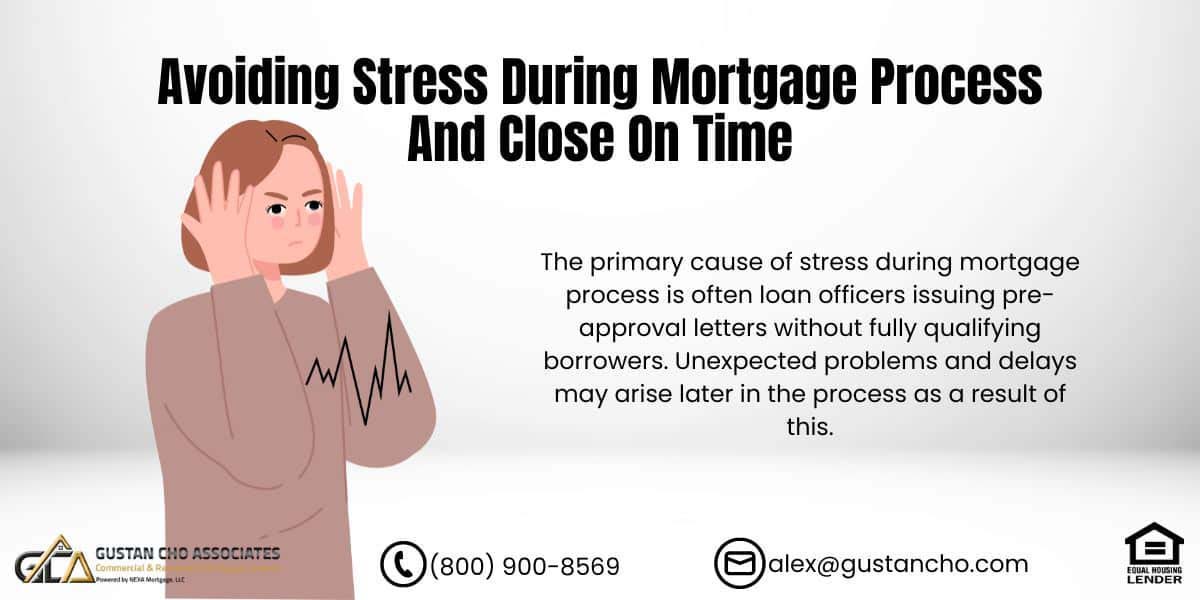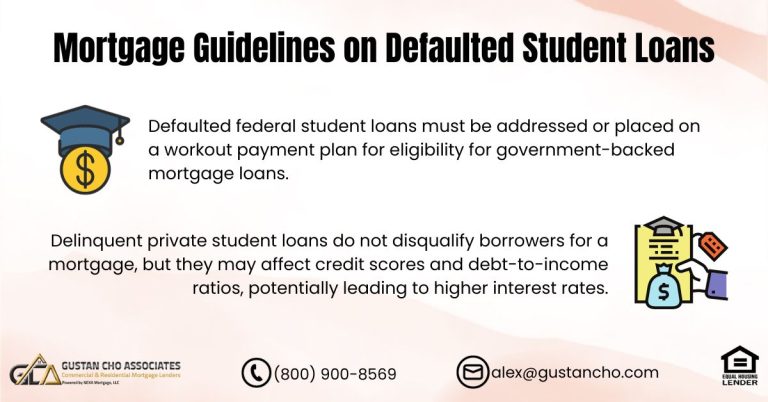This Article Is About Ways Of Avoiding Stress During Mortgage Process And Close On Time
There is no reason why borrowers should experience stress during mortgage process. Avoiding stress during the mortgage process is possible. Borrowers place their trust and faith in their loan officers to ensure their pre-approval is solid. However, like in any industry, there are bad apples.
Some loan officers believe they know everything and try to cut corners, issuing pre-approval letters without fully qualifying borrowers. The loan officer’s requirement to thoroughly qualify borrowers before issuing a pre-approval letter is one of the primary causes of stress during the mortgage process.
Qualifying Borrowers Prior To Issuing Pre-Approvals
Any loan officer can easily qualify and issue a pre-approval for home buyers with the following credit and income profiles:
- 760 FICO
- six-figure paying salary job
- more than ten years on job
- solid 20% down payment for your home purchase
- plenty of reserves
- never late with any payments
- have an executed real estate purchase contract
Homebuyers with these profiles typically do not experience stress during the mortgage process. However, only some have perfect credit, high credit scores, low debt-to-income ratios, and a flawless payment history over many years.
Avoiding stress during mortgage process requires understanding that different financial backgrounds can still lead to successful approval.
Want a Stress-Free Mortgage Process? Let Us Guide You Every Step of the Way!
Contact us today to learn how we can help you close on time and with ease.
Ways In Avoiding Stress During Mortgage Process
Only some have perfect credit, a larger down payment, or high credit scores. Borrowers with previous bad credit, outstanding collections, charged-off accounts, prior bankruptcies or foreclosures, and other derogatory credit can still qualify for home mortgages. Many homebuyers who seek help from Gustan Cho Associates have been told by other lenders that they do not qualify for a mortgage due to overlays or have experienced last-minute mortgage denials.
Most of our clients at Gustan Cho Associates have approached multiple mortgage lenders and were told they do not qualify, causing them significant stress during the mortgage application process.
The primary reason for stress during the mortgage process is that loan officers often issue pre-approval letters without fully qualifying the borrower. By avoiding stress during mortgage process through thorough qualification and proper guidance, borrowers can have a smoother and more successful experience.
Avoiding Stress During Mortgage Process: Will Bad Credit Affect Mortgage Process
Some people have maintained an excellent credit history for their entire lives. Many individuals were significantly affected by the Great Recession and Real Estate Meltdown of 2008. Millions of hard-working Americans lost their jobs, businesses, and homes and filed for bankruptcy. A significant portion of Americans lost all their life savings. Many retirees were compelled to return to the workforce following the real estate collapse.
Millions of homeowners and property investors who held significant property equity saw their investments evaporate almost overnight. Numerous Americans who once had high-paying professional careers, earning six figures, found themselves unemployed and struggling to re-enter the job market. They were often forced to accept positions with lower salaries than previously earned. The Great Recession of 2008 devastated entire industries, highlighting the importance of avoiding stress during mortgage process.
Changes In The Mortgage Industry And Qualifying For Home Loans
The mortgage industry underwent significant changes that have impacted mortgage borrowers:
- All mortgage loan originators and mortgage companies had to go through rigorous testing and licensing requirements, wiping out half of all loan originators
- The sub-prime market and companies and workers who were in the sub-prime lending market totally got wiped out
- Workers had to seek careers in other fields
- Bankruptcies and Foreclosures hit historical highs
- The Great Recession of 2008 was the longest-lasting recession in U.S. History
- Some experts swear that it was more of a Depression than a Recession
- Many have since recovered from the Great Recession of 2008
- They are ready to start their lives over again and want a second chance at homeownership
- Many home buyers stress over their past bad history and worry about being able to get a mortgage
- Many homebuyers who want to get pre-approved get different answers from different lenders on why they do not qualify for a home loan
Despite past financial difficulties, many home buyers stress over their history and worry about qualifying for a mortgage. Different lenders often provide varying reasons for denial, leading to confusion and frustration. Avoiding stress during the mortgage process is crucial, and understanding these industry changes can help borrowers prepare better.
After facing multiple mortgage denials, many borrowers turn to the team at Gustan Cho Associates for assistance. They specialize in helping borrowers navigate the complexities of the mortgage process, focusing on avoiding stress during mortgage process and ensuring a smoother experience for homebuyers.
What is the Mortgage Stress Rule?
The guideline for mortgage stress, also known as the mortgage stress test, aims to verify that borrowers can manage their mortgage payments in the event of rising interest rates or changes in their financial circumstances. Here are the key aspects of the mortgage stress test:
- Higher Interest Rate Benchmark:
- Lenders evaluate your capacity to make mortgage payments at both the existing interest rate and a higher rate. This is typically the greater of the following:
- The Bank of Canada’s five-year benchmark rate.
- The rate your lender offers plus a certain percentage (commonly 2%).
- Lenders evaluate your capacity to make mortgage payments at both the existing interest rate and a higher rate. This is typically the greater of the following:
- Debt-to-Income Ratio:
- Your gross debt service (GDS) ratio and total debt service (TDS) ratio are calculated to ensure they fall within acceptable limits. GDS includes mortgage payments, property taxes, heating costs, and 50% of condo fees, while TDS includes all your debt payments.
- Qualifying for a Mortgage:
- The stress test ensures you can afford the mortgage payments if interest rates rise, reducing the risk of default. This means that even if you qualify for a mortgage at a lower interest rate, you must demonstrate the ability to pay at the higher stress-test rate.
- Purpose:
- The primary goal of the mortgage stress test is to maintain financial stability and prevent borrowers from taking on mortgages they cannot afford in the long term. Both borrowers and lenders are shielded from possible financial difficulties caused by increasing interest rates or fluctuations in income.
- Application:
- The stress test applies to all new mortgage applications, renewals, and refinancing applications. Federally regulated and provincial lenders use it.
Understanding how the mortgage stress test works is crucial for avoiding stress during mortgage process. It helps you prepare for the mortgage application process. It ensures you are financially ready to handle a mortgage, even in a changing economic climate.
Avoiding Stress During Mortgage Process: Working With Our Borrowers And Getting Them Qualified
I always give my borrowers the facts, not just what they want to hear. Sometimes, home buyers want to qualify for a mortgage but need more time to prepare. At Gustan Cho Associates, we work with borrowers who still need to be qualified to get them ready, ensuring they avoid stress during the mortgage process. This preparation can take anywhere from a month to a year.
For those who reach out to us, it’s not a matter of if they will qualify for a mortgage but when. As long as they have documented income, even borrowers with low credit scores and prior bad credit will eventually qualify.
Most of our borrowers do qualify for a mortgage. The team at Gustan Cho Associates provides the proper advice and steps needed for borrowers who do not qualify today to eventually qualify, thus avoiding stress during the mortgage process. Loan approval may come immediately or shortly after following our guidance.
Our team will work with those with very low credit scores or recent late payments to improve and re-establish their credit scores to get them approved, helping them avoid stress during the mortgage process.
We partner with our borrowers throughout the qualifying, processing, underwriting, and closing processes, ensuring they consistently avoid stress during mortgage process.
Ready for a Smooth and Stress-Free Mortgage Process? We’re Here to Help You Close On Time!
Reach out now to discover how we can help you stay on track and close on time.
Lenders With No Overlays On Government And Conventional Loans
Our borrowers at Gustan Cho Associates often find us through referrals from real estate agents, family members, or friends or by discovering us online. When they reach out, they are typically already stressed. After I assure them we can handle their mortgage and get them approved and closed, they often feel disbelief and continue to experience stress during the mortgage process until they finally receive their keys.
When they do, they often break down in happy tears. I greatly respect borrowers who persistently search for a lender who can help them realize their dream of homeownership. I am very familiar with the stress during the mortgage process, and in this article, I will offer advice on avoiding stress during mortgage process. This guidance will make the mortgage application and approval process much smoother for home buyers.
Understand Mortgage Process Is Way To Avoid Stress During the Mortgage Process
To help borrowers avoid stress during the mortgage process, I thoroughly explain the mortgage application and approval stages during our initial phone interview. I stress the importance of the pre-approval stage, as most last-minute denials happen due to poorly issued pre-approvals. Loan officers must often thoroughly review tax returns, unreimbursed expenses, and credit reports.
During the mortgage process, disputing credit is prohibited. Loan officers should never issue pre-approvals with unresolved non-exempt credit disputes, which must be cleared before proceeding.
At Gustan Cho Associates, all pre-approvals are fully qualified. Our loan officers meticulously review documents and credit reports and run automated underwriting systems (AUS). Home buyers should only enter a real estate contract with a solid pre-approval with AUS approval. Properly qualified pre-approvals prevent last-minute denials and reduce stress during the mortgage process.
Are All Pre-Approvals Valid?
Loan officers should always ensure borrowers are properly qualified before issuing pre-approval letters. At Gustan Cho Associates, every pre-approval is thoroughly vetted and solid, with all approvals meeting the approved/eligible criteria per AUS findings. This rigorous process is why we close 100% of our pre-approvals and help our borrowers avoid stress during mortgage process.
Here is why home buyers should never enter into a purchase contract without a pre-approval that has been fully QUALIFIED and vetted:
- The pre-approved borrower then goes out shopping for a home with the pre-approval letter signed off by a loan officer and enters into a real estate purchase contract
- The loan officer then requests a list of documents he or she needs to collect for the mortgage loan processor
The mortgage loan processor then collects the documents such as the following:
- two years tax returns
- two years W-2s
- most recent 30 days paycheck stubs
- 60 days bank statements
- then uploads the whole mortgage loan application and submits it to the opening department of the mortgage company
Once the opening department registers the mortgage loan applications, then the mortgage loan disclosures and application gets emailed out to borrowers for them to acknowledge it and sign and return:
- Once the lender receives the signed disclosures back the mortgage file is ready to be submitted to underwriting
- The file waits until a mortgage loan underwriter gets assigned to it
Following this thorough pre-approval process ensures that borrowers can avoid stress during mortgage process and move smoothly toward closing on their new home.
Top Reasons For Mortgage Loan Denials
Here is what can happen because the loan originator did not qualify home buyers correctly and was not diligent enough prior to issuing the pre-approval letter:
Borrowers can have the debt to income ratios exceeded the maximum allowed:
- The loan officer did not take into account the unreimbursed expenses
- Did not count the 5% of the outstanding collection account balance to count it towards the calculations of the borrower debt to income ratios
- Did not count child support and/or alimony payments
- Did not realize that the borrower had not been in a part-time job for two years so the part-time income cannot be counted
- Did not realize that the borrower did not get a bonus and/or overtime income for two continuous year
- So the part-time and/or overtime income cannot be counted
Had declining part-time and/or overtime income so the mortgage underwriter will not count part-time and/or overtime income.
By avoiding these pitfalls and ensuring thorough qualification, borrowers can significantly focus on avoiding stress during mortgage process.
Credit Disputes During The Mortgage Process
Credit Report:
- A loan application can go into suspense if the underwriter notices credit disputes on the borrowers’ credit report
- Credit disputes during the mortgage process will halt the mortgage process
- Consumers need to retract the credit disputes before the loan application process can proceed
- However, once a credit dispute is retracted, then the chances are credit scores will drop
- Borrowers who barely meet the minimum credit score requirements for a home loan may not qualify if the credit scores drop below the minimum credit score requirement after retracting the credit disputes
This task should have been done prior to the loan officer issuing a pre-approval letter.
Public Records Not Reporting On Credit Report
Public Records:
- Loan originators need to check the recorded date of foreclosure and deed in lieu of foreclosure prior to issuing a pre-approval letter
- There are many times where the reported date on the credit report on a foreclosure or deed in lieu of foreclosure is not correct
- There are mandatory waiting periods after foreclosure and/or deed in lieu of foreclosure
- It is not the date when the homeowner turned in their keys to the bank and it is not the date it was reported on the credit bureaus
- The waiting period start date is the date of the sheriff’s sale and/or the date the deed was transferred out of the homeowners’ name into the name of the mortgage lender
- This is a very common mistake and when mortgage underwriters catch this during the mortgage process
- The borrower does not meet the mandatory waiting period after foreclosure and/or deed in lieu of foreclosure, this will turn into a mortgage loan denial
All of the above bullet points are the main reasons why all pre-approvals need to be fully qualified and vetted by loan officers before a pre-approval letter being issued.
Avoiding Stress During Mortgage Process: Teamwork
The key to avoiding stress during mortgage process is for the loan originator to thoroughly qualify the loan application before issuing pre-approval. Proper pre-qualification ensures that the home purchase process runs smoothly for everyone involved, including buyers, sellers, attorneys, realtors, and other stakeholders.
Each loan application has unique scenarios, especially for borrowers with prior credit issues or high debt-to-income ratios. If any questions or potential issues arise, the underwriting department should review the file before pre-qualification.
Pre-approvals should only be given when there is full confidence that the loan will close on time.
Effective communication and teamwork between borrowers and loan officers are crucial. If there are uncertainties about lending guidelines, consulting with HUD or Fannie Mae is necessary. Proper due diligence before issuing a pre-approval letter is vital for a successful and stress-free mortgage process.
Want to Close On Time Without the Stress? Let Us Help You Navigate the Mortgage Process!
Contact us today to get expert guidance and ensure you close on time and with confidence.
How to Deal with the Stress of Closing on a House?
Closing a house is a significant milestone, and feeling stressed is natural. Here are some strategies for avoiding stress during mortgage process:
- Stay Informed:
- Understand the Closing Process: Familiarize yourself with each step so you know what to expect.
- Review Documents Early: Ask for copies of closing documents in advance to review them at your own pace.
- Stay Organized:
- Create a Checklist: Keep a checklist of all the tasks you must complete before closing, such as obtaining homeowners insurance, transferring utilities, and arranging a final walk-through.
- Keep Important Documents Handy: Keep all necessary documents, such as your ID, proof of insurance, and bank statements, easily accessible.
- Communicate Effectively:
- Stay in Touch with Your Agent and Lender: Regular communication can help prevent last-minute surprises and ensure you know any required actions.
- Ask Questions: Feel free to ask your real estate agent, lender, or attorney any questions. Clear communication can alleviate many concerns.
- Financial Preparation:
- Ensure Funds are Ready: Confirm that the funds for your down payment and closing costs are readily available and that you know how to transfer them.
- Double-Check Figures: Verify the final closing costs and ensure you understand all charges.
- Plan for the Move:
- Schedule Your Move: Plan your moving date and arrange for movers or a rental truck well in advance.
- Pack in Advance: Start packing early to avoid last-minute rushes.
- Self-Care:
- Take Breaks: Allow time to relax and take breaks from house-related tasks.
- Stay Healthy: Ensure you eat well, exercise, and get enough sleep.
- Focus on the Positive:
- Visualize Your New Home: Focus on the excitement of moving into your new home and how you’ll enjoy the new space.
- Celebrate Small Wins: Acknowledge and celebrate each step you complete in the closing process.
- Seek Support:
- Talk to Friends and Family: Discuss your worries with loved ones who can assist you and motivate you.
- Consider Professional Help: If the stress overwhelms you, consider speaking with a therapist or counselor.
By staying organized, informed, and focused on the positive aspects of closing on your new home, you can manage the stress and make the process smoother and more enjoyable.
FAQs: Avoiding Stress During Mortgage Process And Close On Time
-
1. What is the main reason for stress during the mortgage process? The primary cause of stress during mortgage process is often loan officers issuing pre-approval letters without fully qualifying borrowers. Unexpected problems and delays may arise later in the process as a result of this.
-
2. How can borrowers avoid stress during the mortgage process? It is crucial to work with trustworthy loan officers who thoroughly qualify you before issuing a pre-approval letter. You must also stay informed about the mortgage process and maintain open communication with your loan officer.
-
3. What are some qualifications for an easy mortgage process? Borrowers with a high credit score (760+ FICO), stable high-paying job, substantial down payment (around 20%), consistent employment history (over ten years), solid financial reserves, and clean credit history usually experience a smoother mortgage process.
-
4. Can borrowers with bad credit qualify for a mortgage? Yes, borrowers with past credit issues, including bankruptcy or foreclosure, can still qualify for a mortgage. It may require more effort and finding the right lender to work with their specific situation.
-
5. How did the 2008 Great Recession impact mortgage qualifications? The 2008 Great Recession led to the implementation of stricter mortgage qualification requirements. This included rigorous testing and licensing for mortgage loan originators, eliminating sub-prime lending markets, and higher scrutiny of borrowers’ financial histories and qualifications.
-
6. What changes occurred in the mortgage industry post-2008? Mortgage loan originators and companies now face stricter testing and licensing. The sub-prime lending market has been eliminated, leading to tighter regulations to ensure borrowers are fully qualified before being issued a mortgage.
-
7. What should borrowers do if they face multiple mortgage denials? If you’ve faced multiple mortgage denials, contact specialized lenders like Gustan Cho Associates. They can work with unique financial situations and provide guidance to help you eventually qualify for a mortgage.
-
8. What is the mortgage stress test? The mortgage stress test ensures borrowers can manage their mortgage payments even if interest rates increase. It includes assessing the ability to pay at a higher interest rate and evaluating debt-to-income ratios. It is applied to all new mortgage applications, renewals, and refinancing.
-
9. How does working with borrowers help avoid stress? Working with borrowers helps avoid stress by providing an honest assessment and giving them a clear understanding of their qualifications and areas that need improvement. Additionally, offering step-by-step assistance and advice helps borrowers qualify for a mortgage.
-
10. What are some key factors that can lead to mortgage loan denial? Factors that can lead to mortgage loan denial include issues with debt-to-income ratio, outstanding credit disputes, and inaccurate public records regarding foreclosures or bankruptcies.
-
11. How can teamwork and communication help during the mortgage process? Teamwork and communication are essential for thoroughly vetting borrowers, providing clear instructions, and collaborating with all parties for a smooth and timely mortgage process.
-
12. How do you deal with the stress of closing a house? Dealing with the stress of closing on a house involves staying informed, organizing tasks, communicating regularly, preparing financially, scheduling the move, practicing self-care, and seeking support.
If you have any questions about Avoiding Stress During Mortgage Process And Close On Time or you need to qualify for loans with a lender with no overlays, please contact us at 800-900-8569. Text us for a faster response. Or email us at alex@gustancho.com. The team at Gustan Cho Associates is available 7 days a week, on evenings, weekends, and holidays.
This blog about Avoiding Stress During Mortgage Process And Close On Time was updated on May 22nd, 2024.
Stressed About Closing On Time? Let Us Help You Make the Process Easy and Efficient!
Reach out today to learn how we can help you close on time and without hassle.










